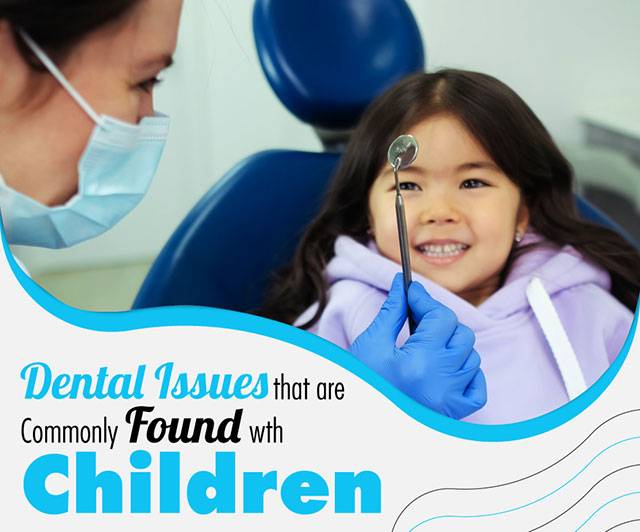Dental Issues That Are Commonly Found With Children

Why You Must Take Care of Your Kids’ Oral Health
The habits you instill early on in life go a long way in ensuring healthier adulthood. This includes quality dental practices. Healthy teeth are a crucial part of a child’s growth. They can talk better, smile more confidently, and also eat better. By ensuring your kids’ oral health, you can avoid the need to go for cosmetic dentistry to undo the damage.
Strong oral care sets your kid for healthy habits in life. On the flip side, poor oral practices can cause all kinds of infections, gum diseases, and myriad teeth problems.
5 Common Kids’ Teeth Problems and Their Solutions
Tooth Decay (Cavities)
Most kids need supervision when it comes to flossing and brushing. On top of that, kids usually consume a sugar-heavy diet which increases the odds of cavity formation. The acid formation can lead to plaque buildup that can damage the enamel and eventually your tooth.
As a parent, you should supervise and teach kids how to properly hold a toothbrush. They need to learn how to brush in all different directions to remove the food particles, bacteria and plaque. If the kids do develop cavities, you would need to go for filling. Fillings involve drilling away the decayed part and filling the hole with a composite material.
Tooth Sensitivity
Tooth sensitivity is a major problem that can be highly uncomfortable. It can disrupt a kids’ focus and peace of mind. Below are some reasons that lead to sensitive teeth in kids –
- Dental decay aka cavities
- Orthodontic treatment
- Missing or cracked filling
- Acid erosion
- Enamel wear
- Newly erupted teeth
- Bruxism aka teeth grinding
You can go for a myriad of treatments to fix sensitive teeth. They can help you reduce the discomfort and pain that your kid might be experiencing. If the underlying cause is a cavity, make sure to visit your dentist before the issue gets worse.
Pediatric Gingivitis and Gum Disease
Most people think that gum diseases are only prevalent among adults. But, sadly that’s not the case. Gum disease and gingivitis tend to affect children equally as adults. It’s pretty common in pediatric practices. Gingivitis is a precursor to most gum diseases. Common signs to watch out for are – slight bleeding during brushing and flossing, swollen gums, and redness around the gumline.
Gum disease is more common among kids with poor oral hygiene. Gum recession and pain are often indicative of some underlying issue. You can avoid that by regular flossing and brushing. In other cases, a kid may develop crooked teeth growth which can lead to teeth crowding. This can hamper their ability to clean their teeth properly. In that case, they may have to wear braces or Invisalign to correct the jawline.
Early Tooth Loss
Injury during play or tooth decay can often lead to loss of a tooth. If a baby loses teeth before permanent teeth have erupted, it can cause teeth to migrate. This can mess up the alignment of the jaw. What’s more, it could also cause permanent teeth to erupt sideways or be crooked.
It’s important that you consult a pediatric dentist in case your kid loses teeth prematurely. Instilling healthy oral hygiene habits and teaching the value of dental health is crucial for their quality of life.
Thumb Sucking
For babies, thumb sucking is a reflex that provides them comfort and relaxation. But, at times, thumb sucking can continue well into older years. If it continues later than the age of 5, that’s when it can affect teeth growth.
Thumb sucking after a certain point can also cause misalignment of teeth, misaligned jaw, and speech issues. To deter your kids from sucking their thumb, you might want to use positive reinforcement rather than a negative one. Reward them whenever they listen to you and stop sucking.
When they fall asleep, remember to take their finger out of their mouth.
Fun Dental Hygiene Tips for Kids’ Oral Health
- Give your kid the freedom to pick their own toothbrush. Let them pick one with their favorite cartoon character or the color of their choice.
- Also, let them pick their favorite flavored toothpaste
- Encourage them to watch videos and read books that encourage dental hygiene.
- Encourage them to use a timer while brushing. Alternatively, put on their favorite song when they brush.
- Reward them when they follow good oral practices. Avoid giving them sugary treats though. Go with something like a gold star or apple slices.
- After a dentist’s visit, play some fun activities with your kids.
Bottom Line
Childhood is a crucial period. This is when you can really instill the value of oral hygiene and teach them healthy dental practices. Your kids will be thankful when they grow into adults.

